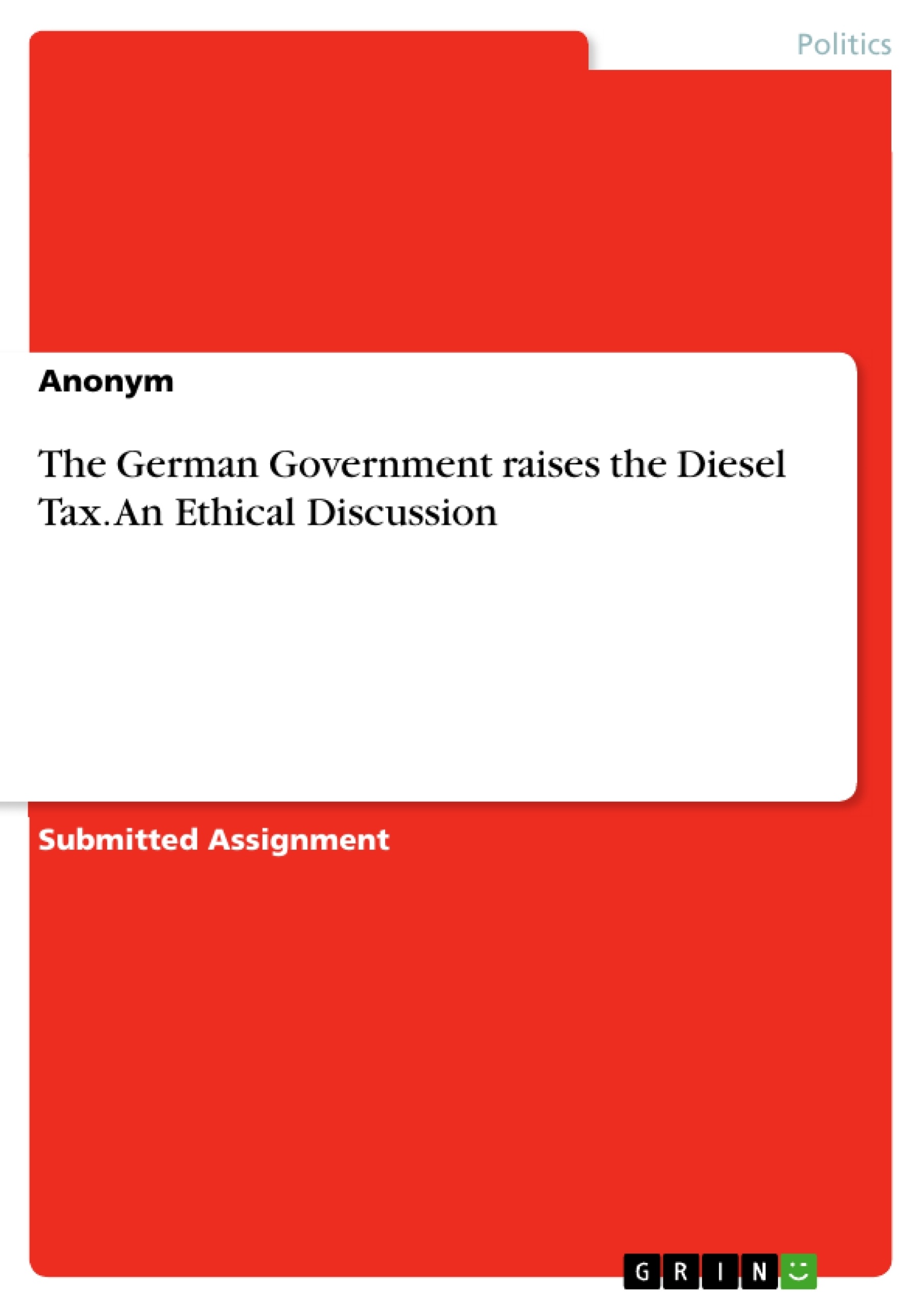In this essay, a price increase for diesel fuel by 5€ per litre is discussed from an ethical point of view, linking it to sustainability considerations and investigating the case with references to different philosophical approaches, such as Immanuel Kant’s categorical imperative, the utilitarianism founded by Jeremy Bentham, or John Rawls’ concept of justice. The aim of this investigation is to find out whether the diesel tax represents a legitimate measure for the reduction of climate-damaging emissions or not. For this purpose, arguments both from a deontological as well as from a teleological perspective are introduced and weighed against each other. In the end, the essay arrives at the conclusion that while constituting indeed a meaningful action against climate change and for the improvement of air quality, the diesel tax nonetheless cannot be described as a just procedure according to the two principles of justice after Rawls and with reference to his concept of the veil of ignorance. In other words, the proposed measure is interpreted as an effective tool for sustainability purposes, but still not ethically justifiable due to the disproportionate discrimination in financial regards against the persons relying on the diesel technology. Therefore, other ways are suggested in order to reduce greenhouse gases and particulate matter emissions, resulting in less drastic consequences for particular actor groups and demanding fewer individual costs, but focusing more on a fundamental political transition process.
Inhaltsverzeichnis (Table of Contents)
- Depiction of the case and definition of the ethical dilemma
- Presentation of the actors
- Line of arguments
- Is the diesel tax and hence the unequal treatment of car owners, legitimate and practical from an ethical perspective?
- Is the diesel tax a meaningful measure from a sustainability perspective?
- Conclusion
Zielsetzung und Themenschwerpunkte (Objectives and Key Themes)
This essay examines a proposed increase in diesel fuel prices from an ethical perspective, considering its sustainability implications and analyzing the case using various philosophical approaches like Kant's categorical imperative, Bentham's utilitarianism, and Rawls' concept of justice. The aim is to determine if the diesel tax represents a legitimate measure for reducing climate-damaging emissions. The essay explores arguments from both deontological and teleological viewpoints and weighs them against each other.
- Ethical implications of a diesel tax on car owners
- Sustainability and environmental impacts of the diesel tax
- Philosophical frameworks for evaluating the diesel tax
- Collective versus individual interests in the context of climate change
- Effectiveness and fairness of the diesel tax as a policy tool
Zusammenfassung der Kapitel (Chapter Summaries)
The first chapter introduces the ethical case of a proposed diesel tax increase in Germany, linking it to the current debate on diesel emissions. It highlights the significant contribution of road traffic to global greenhouse gas emissions and the ethical dilemma arising from the potential discrimination of diesel car drivers for the sake of fighting air pollution and climate change. This chapter establishes the conflict between collective and individual concerns, prompting the exploration of two main questions: 1) Is the diesel tax and its unequal treatment of car owners legitimate and practical from an ethical perspective? and 2) Is the diesel tax a meaningful measure from a sustainability perspective?
The second chapter presents the actors directly and indirectly affected by the diesel tax. It categorizes actors into an inner circle (immediately affected) and an outer circle (indirectly affected but relevant). The inner circle includes individuals owning diesel cars, car dealers, automobile manufacturers, German citizens driving diesel vehicles, investors, and politicians both supporting and opposing the tax. The chapter explores the potential impacts of the diesel tax on each actor group, emphasizing the financial burden on diesel car owners and the potential for business adjustments by car manufacturers and dealers.
Schlüsselwörter (Keywords)
This work focuses on the ethical and sustainability aspects of a diesel tax, examining the arguments for and against such a measure. Key themes include climate change, environmental degradation, individual versus collective interests, deontological and teleological ethics, and concepts of justice, legitimacy, and sustainability. The essay analyzes the case within the frameworks of Immanuel Kant, Jeremy Bentham, and John Rawls, referencing their respective philosophical principles to evaluate the diesel tax's legitimacy and effectiveness.
Frequently Asked Questions
What is the ethical dilemma regarding the proposed diesel tax?
The dilemma involves the conflict between the collective goal of reducing climate emissions and the individual financial discrimination against diesel car owners.
Which philosophical frameworks are used to analyze the diesel tax?
The essay uses Immanuel Kant’s categorical imperative, Jeremy Bentham’s utilitarianism, and John Rawls’ concept of justice.
Is the diesel tax considered just according to John Rawls?
No, the essay concludes that it is not a just procedure according to Rawls' principles of justice and the "veil of ignorance" concept.
Who are the main actors affected by this tax increase?
The primary actors include diesel car owners, car dealers, automobile manufacturers, investors, and politicians.
Is the diesel tax effective from a sustainability perspective?
The essay interprets the measure as an effective tool for sustainability goals, even if it faces ethical challenges regarding fairness.
- Arbeit zitieren
- Anonym (Autor:in), 2020, The German Government raises the Diesel Tax. An Ethical Discussion, München, GRIN Verlag, https://www.hausarbeiten.de/document/1388996


